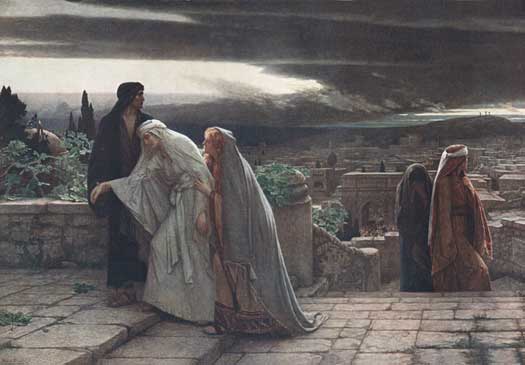On Ash Wednesday...
Feria quarta cinerum in tempi quadragesimæ...
(The Wednesday of ashes in the time of the 40 days i.e. Lent...)
On this day Catholics the world over receive on their foreheads the sign of the cross in ash, administered by the priest, to symbolise the transience of life, the need for repentance (ash being a sign of repentence) and the hope of immortality in the life to come.
As he administers the ashes the priest says (in Latin in the traditional rites):
Meménto, homo, quia pulvis es, et in púlverem revertéris...
Remember, man, that thou art dust, and unto dust thou shalt return...
"What profit hath a man of all his labour which he taketh under the sun?
One generation passeth away, and another generation cometh..." [Ecclesiasticus 1]
So may we well begin this Holy Season of Lent which so much reminds us of the transience of this life and, in contrast, the joys of heaven to come.One generation passeth away, and another generation cometh..." [Ecclesiasticus 1]
In a sense, there is both joy and sadness in Lent - sadness at death but joy at life, the life to come. Lent signifies the 40 days that our Lord spent in the desert fasting and doing penance for us and giving us an example of the way in which we can discipline ourselves to withstand the temptations of the world, grow in grace and virtue and become more truly ourselves, rather than our appetites.
This is our recollection behind the imposition of ashes on the forehead on Ash Wednesday. We are reminded of our mortality and that we shall return unto the dust from which man was originally made.
The words said by the priest come from Genesis 3:19 when Adam and Eve were made subject to the corruption of death and dying with the words of God ringing in their ears:
"for dust thou art, and unto dust thou shalt return"
"Remember friends as you pass by,
as you are now so once was I.
As I am now so you must be.
Prepare for death and follow me."
as you are now so once was I.
As I am now so you must be.
Prepare for death and follow me."
From the Roman Office of the Dead, the Anglican divines took the words of Job and used them for the Anglican burial service. They have since thereby become famous, used in many a film setting. They are powerful words:
"MAN THAT IS BORN OF WOMAN hath but a short time to live, and is full of misery. He cometh up and is cut down like a flower; he flieth as it were a shadow, and never continueth in one stay. In the midst of life we be in death: of whom may we seek for succour but of thee, O Lord, which for our sins justly art displeased. Yet, O Lord God most holy, O Lord most mighty, O holy and most merciful saviour, deliver us not into the bitter pains of eternal death. Thou knowest, Lord, the secrets of our hearts, shut not up thy merciful eyes to our prayers: but spare us Lord most holy, O God most mighty, O holy and merciful saviour, thou most worthy judge eternal, suffer us not at our last hour for any pains of death to fall from thee." [Job 11]
On Ash Wednesday, the ashes are made by the burning of the palms from the previous year's Easter.
The imposition of ashes signifies sorrow for sin, contrition, spiritual aid and the receiving of grace thereby.
The head, being the seat of pride, is then imposed with ashes in the form of a cross as the priest utters the words reminding us of our mortality.
We should wear this sign of penance as a memento mori (remembrance of death) and as a sign of witness against the concupiscence of the world.

This painting shows the return of the Blessed Virgin after the Crucifixion on Calvary.
In the distance can be seen the 3 crosses upon Calvary mount. It is a fitting theme for the penitential season of Lent - or Great Lent as the Greeks call it. Lent is a time of very moving and indeed hauntingly beautiful liturgy and chant.
Ash Wednesday begins with the reading from Joel the Prophet, Chapter 2:
“Now therefore saith the Lord: Be converted to me with all your heart, in fasting, and in weeping, and in mourning. 13 And rend your hearts, and not your garments, and turn to the Lord your God: for he is gracious and merciful, patient and rich in mercy, and ready to repent of the evil. 14 Who knoweth but he will return, and forgive, and leave a blessing behind him, sacrifice and libation to the Lord your God? 15 Blow the trumpet in Sion, sanctify a fast, call a solemn assembly, 16 Gather together the people, sanctify the church, assemble the ancients, gather together the little ones, and them that suck at the breasts: let the bridegroom go forth from his bed, and the bride out of her bride chamber. 17 Between the porch and the altar the priests the Lord's ministers shall weep, and shall say: Spare, O Lord, spare thy people: and give not thy inheritance to reproach, that the heathen should rule over them. Why should they say among the nations: Where is their God? 18 The Lord hath been zealous for his land, and hath spared his people. 19 And the Lord answered and said to his people: Behold I will send you corn, and wine, and oil, and you shall be filled with them: and I will no more make you a reproach among the nations.”
On the First Sunday of Lent the Gospel reminds us of the precedent for Lent: our Lord's 40 days in the desert fasting.
On the Saturday in Ember week of Lent, when it was customary to have Ordinations to the clerical state, there are 6 readings including the Gospel and many beautiful chants.

Ivan Kramskoy. Christ in the Desert. 1872.
It is customary to sing the Lenten chant Attende, Domine, et miserere - "Listen, O Lord, and have mercy".
Here it is in chant:
To Thee, highest King,
Redeemer of all,
do we lift up our eyes
in weeping:
Hear, O Christ, the prayers
of your servants.
Hear us, O Lord, and have mercy, because we have sinned against Thee!
Redeemer of all,
do we lift up our eyes
in weeping:
Hear, O Christ, the prayers
of your servants.
Hear us, O Lord, and have mercy, because we have sinned against Thee!
...
Innocent, He was seized,
not refusing to be led;
condemned by false witnesses
because of impious men;
O Christ, keep safe those
whom Thou hast redeemed!
Hear us, O Lord, and have mercy, because we have sinned against Thee!
In many communities, both religious and secular, it was also customary to have numerous additional pious devotions including chants, hymns and canticles dedicated to the instruments of the Passion, for instance the Holy Lance and the Holy Nails.

Love never dies...
+++
















.jpg)


























_-002.jpg/220px-Circle_of_Anton_Raphael_Mengs,_Henry_Benedict_Maria_Clement_Stuart,_Cardinal_York_(ca_1750)_-002.jpg)



9 comments:
Hello Tribunus,
I wanted to ask you about the Anglo-Scottish wars, since the issue has been confused by the Scottish nationalists, and by films like Braveheart.
You there Tribunus?
Yes, Irish Jacobite, I'm here now. Sorry - professional work has intervened.
Fire away with any comments, questions etc...
Hello Tribunus,
I wanted to ask you about the Anglo-Scottish wars, since the issue has been confused by the Scottish nationalists, and by films like Braveheart.
Just the things about the
Anglo-Scottish wars I asked earlier.
Can you remind me where you posted your questions?
Trib.
The Ash Wednesday post, Trib.
This IS the Ash Wednesday post. Can't see your questions. If you are asking me whether Braveheart was a Scottish Nationalist, I would say in one sense yes, in another no. He wouldn't have any time for the modern Scots Nats. In his day, the Anglo-Scottish wars were fights between nobles over territory.
Thanks for sharing, nice post! Post really provice useful information!
An Thái Sơn chia sẻ trẻ sơ sinh nằm nôi điện có tốt không hay võng điện có tốt không và giải đáp cục điện đưa võng giá bao nhiêu cũng như mua máy đưa võng ở tphcm địa chỉ ở đâu uy tín.
Post a Comment